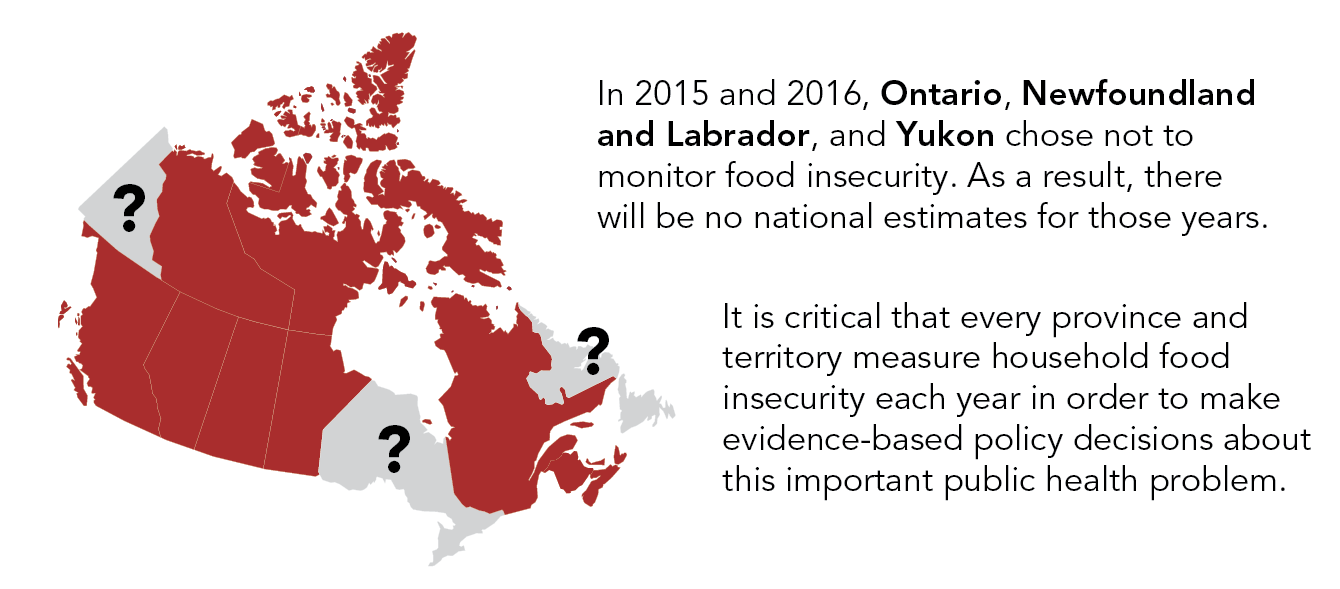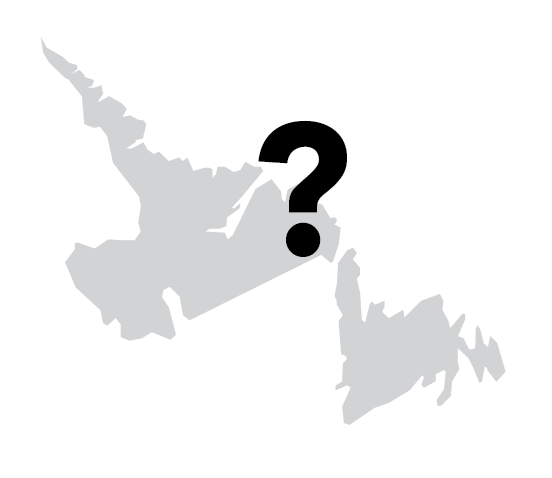
 The inclusion of the Household Food Security Survey Module (HFSSM) on the annual cycles of Statistics Canada’s Canadian Community Health Survey (CCHS) has enabled the monitoring of food insecurity in Canada. However, the HFSSM is not always mandatory. We recently learned that the measurement of food insecurity on the CCHS was optional in 2015 and 2016, and Ontario, Newfoundland and Labrador, and the Yukon opted out.
The inclusion of the Household Food Security Survey Module (HFSSM) on the annual cycles of Statistics Canada’s Canadian Community Health Survey (CCHS) has enabled the monitoring of food insecurity in Canada. However, the HFSSM is not always mandatory. We recently learned that the measurement of food insecurity on the CCHS was optional in 2015 and 2016, and Ontario, Newfoundland and Labrador, and the Yukon opted out.
As a result, it is not possible to accurately estimate the prevalence of household food insecurity nationally for those years. The most recent national estimate available is from 2012 when the HFSSM was mandatory for all jurisdictions. We know that food insecurity rose significantly between 2007 and 2012, but cannot reliably determine whether the problem has gotten better or worse since then. The next national assessment of food insecurity will be in 2017. This gap in data impedes research on trends in food insecurity and the impact of public policies on the problem. It is critical that provinces and territories participate in all cycles of measurement.
Ontario
 Ontario is the most populous jurisdiction in Canada and home to the single largest number of food insecure households. Ontario’s decision to opt out of measurement has serious consequences for analyses of trends in food insecurity, limiting our ability to see the impact of policy changes over this period. The lack of data for 2015 and 2016 also has ramifications for the assessment of the recently announced Ontario Food Security Strategy and Ontario Basic Income Pilot. Until now, Ontario has participated in monitoring in every cycle since the inclusion of the module on the CCHS in 2005.
Ontario is the most populous jurisdiction in Canada and home to the single largest number of food insecure households. Ontario’s decision to opt out of measurement has serious consequences for analyses of trends in food insecurity, limiting our ability to see the impact of policy changes over this period. The lack of data for 2015 and 2016 also has ramifications for the assessment of the recently announced Ontario Food Security Strategy and Ontario Basic Income Pilot. Until now, Ontario has participated in monitoring in every cycle since the inclusion of the module on the CCHS in 2005.
Newfoundland and Labrador
 In addition to opting out of measurement in 2015 and 2016, Newfoundland and Labrador opted out in 2013 and 2014, meaning there are no data for this province beyond 2012. A substantial decrease in food insecurity among social assistance recipients in Newfoundland and Labrador was observed between 2007 and 2012, following the rollout of their poverty reduction strategy in 2006. However, due to the lack of data it is not possible to examine the impact of subsequent policy changes.
In addition to opting out of measurement in 2015 and 2016, Newfoundland and Labrador opted out in 2013 and 2014, meaning there are no data for this province beyond 2012. A substantial decrease in food insecurity among social assistance recipients in Newfoundland and Labrador was observed between 2007 and 2012, following the rollout of their poverty reduction strategy in 2006. However, due to the lack of data it is not possible to examine the impact of subsequent policy changes.
Yukon
 Yukon is the only territory to have ever opted out of food insecurity monitoring on the CCHS, having previously opted out in 2005, 2013, and 2014. From the most recent estimates from 2012, 17.1% of households in Yukon are food insecure and 1 in 5 children are affected. But, we have no way of knowing whether this problem has gotten better or worse since then.
Yukon is the only territory to have ever opted out of food insecurity monitoring on the CCHS, having previously opted out in 2005, 2013, and 2014. From the most recent estimates from 2012, 17.1% of households in Yukon are food insecure and 1 in 5 children are affected. But, we have no way of knowing whether this problem has gotten better or worse since then.
Regular monitoring of household food insecurity is fundamental to population research and evidence-based policy decision making in Canada. The lack of comprehensive, up-to-date statistics is detrimental to efforts to address this serious public health problem. Food insecurity measurement needs to become mandatory annually in all provinces and territories.
For more information on the measurement of food insecurity in Canada, please see our Monitoring Food Insecurity in Canada fact sheet and our annual reports.
Commentary | Story
Provinces and Territories Opting Out of Measuring Household Food Insecurity
May 25, 2017
As a result, it is not possible to accurately estimate the prevalence of household food insecurity nationally for those years. The most recent national estimate available is from 2012 when the HFSSM was mandatory for all jurisdictions. We know that food insecurity rose significantly between 2007 and 2012, but cannot reliably determine whether the problem has gotten better or worse since then. The next national assessment of food insecurity will be in 2017. This gap in data impedes research on trends in food insecurity and the impact of public policies on the problem. It is critical that provinces and territories participate in all cycles of measurement.
Ontario
Newfoundland and Labrador
Yukon
Regular monitoring of household food insecurity is fundamental to population research and evidence-based policy decision making in Canada. The lack of comprehensive, up-to-date statistics is detrimental to efforts to address this serious public health problem. Food insecurity measurement needs to become mandatory annually in all provinces and territories.
For more information on the measurement of food insecurity in Canada, please see our Monitoring Food Insecurity in Canada fact sheet and our annual reports.